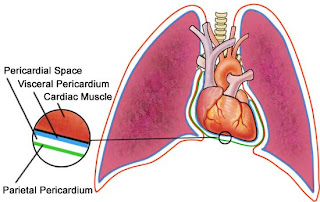
As with both the pleura and the peritoneum, the growth of tumors in the pericardial region causes the expansion of tissue and allows fluid to accumulate around the heart The fluid can interfere with the functioning of the heart……. It is this fluid that is responsible for most of the symptoms of pericardial mesothelioma. These symptoms include:
Chest pain, ranging from uncomfortable to severe
Shortness of breath
Heart palpitations
Persistent coughing
Extreme fatigue after minimal activity or exertion
Pericardial mesothelioma resembles the other types of asbestos-caused mesothelioma in that the symptoms are often mistaken for something more common. In this case, heart attack or some other sort of heart disease is suspected, especially when the patient begins complaining of persistent chest pains.
Symptoms can vary with each patient and can be affected by a number of variables, including the location and size of the tumors and the overall health of the patient. The age of the patient may also factor into the equation.
A thorough patient history is the key to the proper diagnosis of the disease. Anyone who worked with asbestos or asbestos-containing products, particularly in shipyards or in the construction field, should always mention their exposure to their doctor. Because this is a rare disease, other diagnoses are usually considered before doctors investigate the possibilities of mesothelioma.
0 comments:
Post a Comment